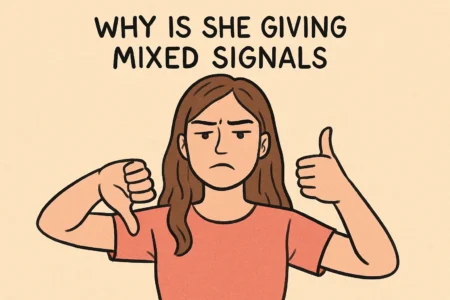It starts with a feeling. A quiet little knot in your stomach you can’t quite name. You tell yourself it’s nothing. Every couple hits a rough patch, right? Perfect relationships don’t exist. But the feeling doesn’t go away. In fact, it grows. That little knot tightens into a constant dread. Laughter feels forced. Talking feels like walking through a minefield. You start replaying conversations, editing your own words, second-guessing your every move. Eventually, you find yourself alone, typing a question you’re terrified to ask into a search bar: is my relationship toxic?
Just asking that question is a huge first step. It’s a brave moment. It’s that part of you that refuses to be silenced. It’s so hard to look at the person you love, at the life you’ve built together, and admit that it might be breaking you. The line between a tough time and a truly toxic dynamic is incredibly blurry when you’re on the inside. This isn’t about blame. It’s about clarity. It’s about helping you see the signs, the subtle and the obvious, so you can stop questioning yourself and start trusting your gut.
More in Relationship Health Category
Key Takeaways
- Trust Your Gut: That constant feeling of being on edge or unhappy isn’t just in your head. It’s a major red flag. Your body often knows something is wrong long before your mind wants to admit it.
- Control is the Real Issue: Toxic relationships are almost always about control. It can be about money, who you see, or chipping away at your confidence with “jokes” and emotional games.
- Boundaries Are Everything: A good partner respects your “no.” Someone toxic will push, plead, and guilt you until your boundaries crumble.
- It’s Not Always Loud Fights: The worst kind of toxicity is often quiet. It’s the gaslighting that makes you question what’s real, the endless refusal to take blame, and the good/bad cycle that keeps you hooked on hope.
- Seeing It Is Step One: Simply naming these behaviors is powerful. It breaks the spell of confusion and gives you the power to choose what’s best for you.
Does It Feel Like You’re Always Walking on Eggshells?
This is it. The most common sign. That constant, humming anxiety that you’re one wrong word away from an argument, the silent treatment, or a total meltdown. You stop living to make yourself happy and start living to prevent their next bad mood. Your main goal becomes keeping the peace, even if it costs you your own opinions and happiness.
That’s not normal. Not even close. A healthy relationship is a safe space, not a minefield. It should be the one place on earth you can be your messy, imperfect, true self without fear. When that comfort is gone, replaced by the full-time job of managing someone else’s emotions, the dynamic is broken.
Is Every Little Disagreement a Full-Blown Crisis?
Remember when you could just disagree on what to watch for dinner? In a toxic relationship, that’s a luxury. The smallest difference of opinion can explode into a major fight. Your partner might treat your different taste in music as a personal insult. So, you learn to stop having opinions. It’s just not worth it. They have a way of blowing things so far out of proportion that you feel stupid for even bringing it up.
I remember this all too well. My ex would get unbelievably angry over the tiniest things. One time, I was ten minutes late to dinner. Traffic was awful. I couldn’t have helped it. But instead of a simple, “Hey, you made it,” I got the silent treatment. For the rest of the night. It bled into the next day. I spent 24 hours apologizing profusely for something I couldn’t control. It didn’t take long for me to develop a paralyzing fear of making any mistake, no matter how small.
Do You Censor Yourself to Keep the Peace?
Think about it. When you’re with friends, are you really there? Or are you mentally rehearsing the story you’ll tell your partner later? You need the “safe” version. This self-censorship is a blaring alarm. It’s when you stop sharing good news because you know they’ll find a way to make you feel small about it. You stop talking about your struggles because you know they’ll just twist it and blame you.
You become the editor of your own life. It’s exhausting. You carefully snip and curate your experiences to avoid a bad reaction. This is so damaging. Over time, you start to lose yourself. Your own voice gets buried. A loving partner is supposed to be your biggest fan, not your harshest critic.
Is Your Partner a Master of Subtle Control?
Control isn’t always a loud demand or an angry threat. Often, it’s much sneakier. It can be disguised as love, as concern, even as a joke. This is called coercive control, and it’s a quiet campaign to dismantle your independence. It’s designed to make you smaller, more dependent, and much easier to manage.
It happens one tiny piece at a time. Then one day, you wake up and realize you barely see your friends anymore, you have to ask for your own money, and you feel a constant, nagging shame. You didn’t see the cage being built because it was built one bar at a time.
Are Your Finances No Longer Just Your Own?
Money is power. Financial abuse is one of the most effective ways to trap someone. It isn’t always as obvious as them taking your paycheck. It’s more subtle. It might start with an offer to “help” you with the bills because “you’ve never been good with money.” Before you know it, you’re asking for an allowance from the money you earned.
They might grill you over every single purchase, making you feel childish for buying a coffee. They might rack up secret debt in your name. Or they might start a massive fight right before you have a big presentation at work, sabotaging your career. This has nothing to do with teamwork or budgeting. It’s about stripping you of your power to leave.
Do They “Joke” About Your Flaws a Little Too Often?
There’s a world of difference between loving banter and mean-spirited “jokes.” A toxic person loves to use humor as a weapon. It gives them a free pass to criticize you. They make jabs about your weight, your laugh, your dreams, your friends. And if you dare to get upset? It’s your fault. “God, you’re too sensitive. I was just kidding.”
I once dated a guy who loved to “roast” me in front of people. He’d mock my career ambitions, calling them my “cute little projects.” He’d make fun of how I told a story. Our friends would give a tight, awkward laugh, and I’d just smile, my face burning. I actually believed him for a while. I thought the problem was me—I was just too sensitive. It took years to see it for what it was. It wasn’t a joke. It was cruelty in disguise, a strategy to crush my self-esteem.
Does It Seem Like They’re Slowly Turning You Against Your Friends?
Isolating you is a key move for a controlling partner. They want to be your entire world. Anyone else who supports you—your friends, your family—is a threat. It’s a slow, quiet process.
It might start with little comments. “Sarah’s a bit much, don’t you think?” or “I don’t get the feeling your family likes me very much.” Then it gets worse. They’ll invent a crisis right as you’re about to walk out the door to see your friends, forcing you to stay. They’ll lay on the guilt. “I guess you’d rather hang out with them than me.” Slowly but surely, your support system is gone. The only person you have left is them. And that’s exactly what they want.
What Happens When You Try to Set a Boundary?
How someone reacts when you say “no” tells you everything you need to know about them. A boundary is just you protecting yourself. It’s a line. It’s you saying what you will and won’t put up with. In a healthy relationship, boundaries are respected. In a toxic one, they’re treated like a personal attack.
A toxic partner will poke, push, and stomp all over your boundaries. They don’t see you as a whole person with your own needs. They see you as a part of them. When you try to create a little space for yourself, they act like you’ve deeply wounded them.
Is “No” a Complete Sentence in Your Relationship?
You are allowed to say no. No to sex. No to plans you don’t want to do. No to a conversation you’re not ready for. You don’t need to explain yourself. “No” is enough.
If your “no” is always the start of a long, draining negotiation, that’s a huge problem. If you have to spend an hour defending your right to simply not do something, you’re not being respected. A partner who loves you might be disappointed by your “no,” but they will accept it. A partner who wants to control you will see it as a challenge. They will use pressure, guilt, and manipulation until your “no” becomes a “yes.”
Do They Use Guilt to Get Their Way?
Guilt is a toxic person’s favorite tool. When they can’t force you to do something, they’ll manipulate you into it. They’ll make you feel like the worst person in the world for saying no. It’s a cruel game designed to make you break your own boundaries just to stop feeling so awful.
You’ll hear things like:
- “After everything I do for you, you can’t do this one thing for me?”
- “Fine. I see my feelings don’t matter at all.”
- “I thought I could count on you, of all people.”
- “If you really loved me, you’d do it.”
This isn’t them being genuinely hurt. It’s a trick. It’s a way to make you responsible for their emotions, forcing you to betray yourself to make them happy.
Does the Blame Game Feel Like an Olympic Sport?
In a toxic relationship, nothing is ever their fault. Ever. If they’re late, it’s because you didn’t remind them. If they yell, it’s because you “made them” angry. They are completely incapable of taking responsibility for their own life. Instead, they become experts at deflecting blame, and you’re the number one target.
This is so destructive. It puts you in the position of being the one who’s always wrong. After a while, you might even start to believe it. You start thinking that if you could just be a little better, a little smarter, a little more perfect, then everything would be okay.
Are You Always the One Apologizing?
Think about your last few arguments. Who said sorry first? If you’re the one who is constantly apologizing—even for things that aren’t remotely your fault—you’re with someone who refuses to be accountable.
You apologize for their bad mood. You apologize for having feelings. You apologize just to make the fighting stop because you know, deep down, they never will. That isn’t a compromise. It’s a surrender. You’re giving up your own reality for a few hours of fake peace.
Have You Ever Heard of Gaslighting?
Gaslighting is a particularly nasty form of manipulation where someone makes you question your own sanity. It’s a core tactic of emotional abuse. The name comes from an old play where a husband secretly dims the gas lights in the house and, when his wife notices, he tells her she’s imagining it until she thinks she’s going crazy.
That’s exactly how it works. Your partner will deny something they said five minutes ago. They’ll twist your words. They’ll call you “crazy” or tell you you’re “making things up.” As the National Domestic Violence Hotline explains, it’s a tactic used to gain power. After a while, you feel like you can’t trust your own mind anymore. It’s a terrifying and profoundly damaging experience.
How Does Your Body Feel When You’re Around Them?
Sometimes, your head is the last to know. We are experts at making excuses for people we love. But our bodies don’t lie. Your body keeps score. The constant stress and emotional pain show up in physical ways.
Listen to it. Do you feel sick to your stomach when you hear their keys in the door? Does your heart pound when you see their name on your phone? Do you feel a wave of pure relief the second they leave? That’s not random. That’s your nervous system telling you that you are not safe.
Do You Feel Drained Instead of Energized?
A good relationship should feel like a charging station. It should fill you up. Obviously, you support each other through hard times, but overall, it should add to your life, not subtract from it.
A toxic relationship is an energy vampire. It’s draining. The constant tension, the drama, the second-guessing—it sucks the life out of you. You might find you’re too tired for work, for friends, for hobbies you used to love. If you consistently feel exhausted after being with your partner, it’s a sign they are draining you dry.
Are Headaches and Stomachaches Becoming Your New Normal?
Your body wasn’t built to live in a constant state of fight-or-flight. The stress from walking on eggshells and feeling unsafe will eventually make you sick. Your emotional pain becomes real, physical pain.
You might notice things like:
- More headaches or even migraines
- Constant stomach issues
- Achy neck and shoulder muscles that never seem to relax
- Trouble sleeping
- Getting sick more often than you used to
These aren’t just random symptoms. This is your body begging you to pay attention.
Is There a Dr. Jekyll and Mr. Hyde Situation Going On?
One of the most confusing things about a toxic relationship is that it’s not all bad. If it was, leaving would be easy. Instead, it’s a rollercoaster. There are amazing highs. Times when your partner is charming, loving, and fun—the person you fell in love with. That’s Dr. Jekyll.
And then, like a switch flips, they’re gone. Replaced by someone cold, cruel, and angry. Mr. Hyde. This unpredictable cycle is a powerful psychological trap called intermittent reinforcement. It’s the same reason people get addicted to gambling. You put up with all the losses for that rare, amazing win.
Are You Living for the “Good Days”?
The good days are the glue that holds you there. After a horrible fight, your partner might suddenly become the perfect partner again. They’ll be sweet, apologetic, and shower you with affection. You feel this incredible rush of relief. You think, This. This is the real them. We’re going to be okay.
That’s the trap. You start to endure the bad times, telling yourself it’s worth it for those moments of good. But in a healthy relationship, good days aren’t a rare prize you win. They’re just… normal days. They’re the standard, not the exception.
Does Their Charm Disappear Behind Closed Doors?
Watch how your partner acts around other people. Many toxic people are brilliant actors. In public, they’re the life of the party. Charming, funny, attentive. Your friends and family probably think they’re incredible. They put on a great show.
But the second you’re alone, the mask drops. The charm vanishes. They become moody, critical, or just ignore you. This is so isolating because it makes you feel like you’re the crazy one. Like no one would ever believe you. You start to think, “Is it just me?” It’s not just you. You’re just the only one they’re letting see the real person behind the curtain.
What Now? Recognizing the Signs Is the First Step
If you recognized your life in these words, you’re probably feeling a lot right now. It can be a punch to the gut to finally put a name on what you’ve been going through. Take a breath. Be proud of yourself for being brave enough to even look at this.
This isn’t about making your partner out to be a villain. It’s about being honest about the patterns. It’s about seeing that the dynamic itself is toxic, and it’s hurting you. You didn’t cause this. You can’t fix them. The only person you can control is you.
Seeing the truth is the first, most powerful step. It’s the moment you stop making excuses. It’s the beginning of getting your voice back. It’s the start of reclaiming your life. You deserve a love that feels safe. You deserve respect. You deserve to be happy—not just on the good days, but every single day.
FAQ – Is My Relationship Toxic

What are the initial signs that indicate a relationship might be toxic?
The earliest signs include feeling constantly anxious, walking on eggshells, self-censorship, and a persistent sense that something is wrong, even if it’s not immediately obvious.
How can I tell if my partner is subtly controlling me?
Subtle control often manifests as disguised concern or jokes that belittle you, combined with behaviors like isolating you from friends, micromanaging your finances, or making you question your independence.
What physical symptoms might indicate emotional stress from a toxic relationship?
Physical signs include frequent headaches, stomach issues, muscle tension, trouble sleeping, and a general feeling of exhaustion, all of which reflect your body’s response to ongoing emotional stress.
What does it mean when I experience mood swings or see a partner switch between being charming and cruel?
This rollercoaster pattern, known as intermittent reinforcement, involves unpredictable long periods of positivity followed by toxicity, making it difficult to leave because the ‘good’ days feel so rewarding.
Why do toxic partners often act differently in public compared to private?
Many toxic individuals are skilled actors who appear charming and attentive in public to impress others, but behind closed doors, their true, critical, or moody nature emerges, leading to isolation and self-doubt for their partners.





